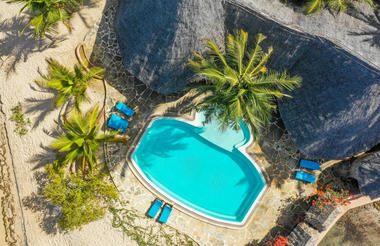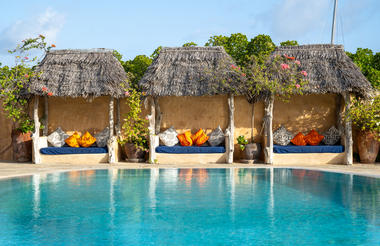Arrive at Nairobi's Jomo Kenyatta International Airport, met on arrival and transfer to Wilson Airport for the daily schedule to Nanyuki. Met and transfer to the Karisia base station to start your 3 day mobile camping safari.
Starting from the Tumaren Conservancy base, set off for 3 days walking with camels and guided by Masai and Samburu tribes people. The riding camels walk with you carrying heavier cameras, water and snacks while the bulk of the remaining camels bear the tents, fly sheets and kitchen straight to the next camp. The walks traverse the beautiful landscapes that tell the story of the turbulent geolocical past of the Rift Valley. Look for artifacts that include flints, shards, and pottery that litter the ground.
Camp by Nyasura, a tall rocky outcrop that is visible for miles and in the evening after a walk scale its slopes for a view and sundowner.
Sleep in Kodiak hunting tents with shared toilet and bucket showers which are filled on request with hot water. Lighting is using solar lamps.
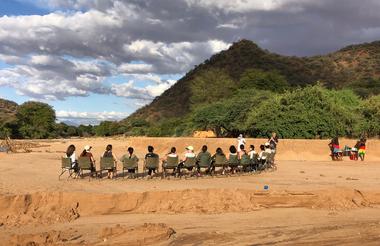
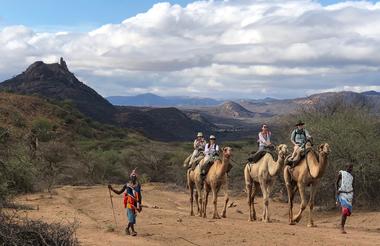
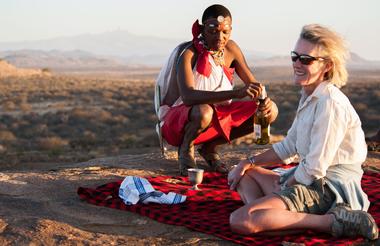
Full board accommodation including soft drinks, beer and house wine
Daily walks while moving camp escorted by Masai and Samburu guides
Visits to local manyattas (villages) and local markets
Rock climbing
Conservancy fees
Laundry
Spirits and premium drinks
Any personal shopping you may do in the village or market
Porterage and gratuities to the camp staff and guides
After breakfast, break camp and head off to the next destination. Today you may pass by a Manyatta (village) and on Tuesdays and Wednesday there is a local market.
Stop at midday for lunch and when its cooler start out to your next campsite.

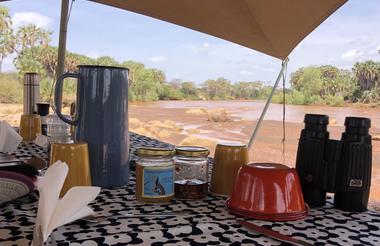

Walk through rich acacia bush country looking for wild animals. Elephants especially are attracted to the rive with its muddy stretches and offers a great opportunity to photograph these riveting animals. It is not uncommon to run into lion, leopard, hyena or wilddog along the course of the safari.
Leaving Karisia very early drive to Nanyuki for the morning flight to the Masai Mara. Fly over the Great Rift Valley to the famous Masai Mara. Met at the Keekorok airstrip and drive through the park to Enkewa Camp.
Your days on safari can be spent as you wish and your driver/guide will discuss each day with you as you go along. The norm is an early wake up with coffee/tea around 6am to depart on a pre-breakfast game drive at about 630am. Being so close to the equator Kenya’s sunrise and sunset varies by an hour at most throughout the year, the temperature can also be comparatively cold in the early mornings and evenings, so it is a good idea to dress in layers when you go out on a drive as the middle of the day will be hot and dry.
After a sumptuous breakfast, the middle of the day is yours to do with as you please, many people go back to their tents and have a shower, perhaps read and take a nap before lunch or play board games in the main mess/lounge area of camp. After lunch you have a few hours to relax again before heading out around 330/4pm on an afternoon game drive – perhaps follow up on the pride of lion you saw in the morning, or head out to look for an elusive leopard or cheetah. After the game drive is time for a well-deserved pre-dinner drink around the camp fire and a chance to swap stories with other guests.

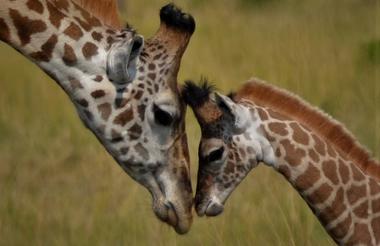

Full board accommodation and soft drinks, beer and house wine
Morning and afternoon and/or full day safaris with professional guide and Masai spotter
Brush breakfast, bush lunch
Sundowners
Airstrip transfers (Keekorok)
Park entry fees
Spirits and premium brand drinks
Porterage and gratuities
Personal exras
Any activity not included such as Balloon Ride
Check out from camp and transfer to Keekork for the morning flight to Nairobi to connect with the afternoon flight to Lamu.
Days at leisure to relax after the safari and enjoy the clear Indian Ocean waters
A visit to Lamu, Kenya’s oldest living town dating back to the 14th century, is highly recommended. The old town is inscribed on the World Heritage List as “the oldest and best-preserved Swahili settlement in East Africa”. The population of Lamu is ethnically diverse, resulting in a mix known as Swahili.
Due to the narrowness of the streets there are few cars and the town is easily explored by foot. We can organise a local resident guide who will show you around the town, its fort, the mosques and other points of interest. He can also point out jewellery and carving shops. Allow yourselves a couple of hours in the little museum that is dedicated to Swahili culture, plus there is an authentic 18th century Swahili house to visit. You can have lunch in town but bear in mind all the shops close for lunch and around prayer times.
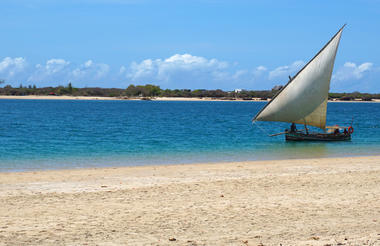
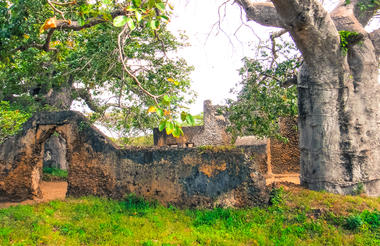
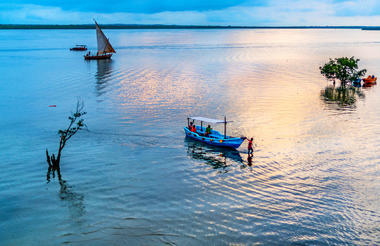
Accommodation
All meals during your stay
Desalinated drinking water
Airstrip transfers from Manda airport
Use of the swimming pool
Use of Games Room activities
Use of yoga room
Kayaking, Sailing, Windsurfing, SUPboarding
Laundry & WiF
All drinks from the bar, including bottled water
Deep sea fishing
Motorised activities
Snorkelling and conservation fees
Spa treatments
Archaeoligical site visits
Guide fees for Lamu and museum entrance fees
Gratuities and items of a personal nature
Scenic flights and charters






